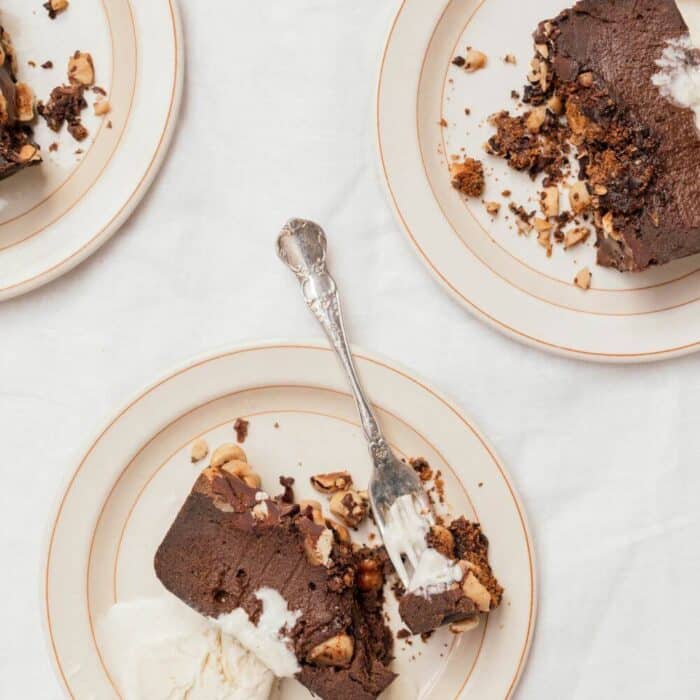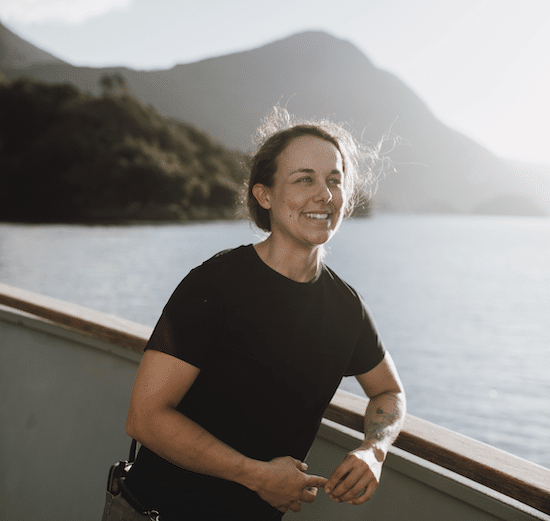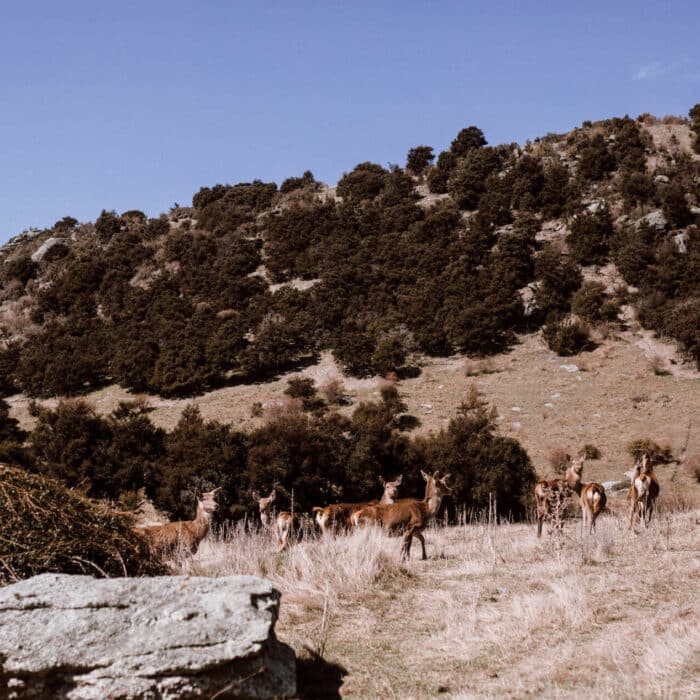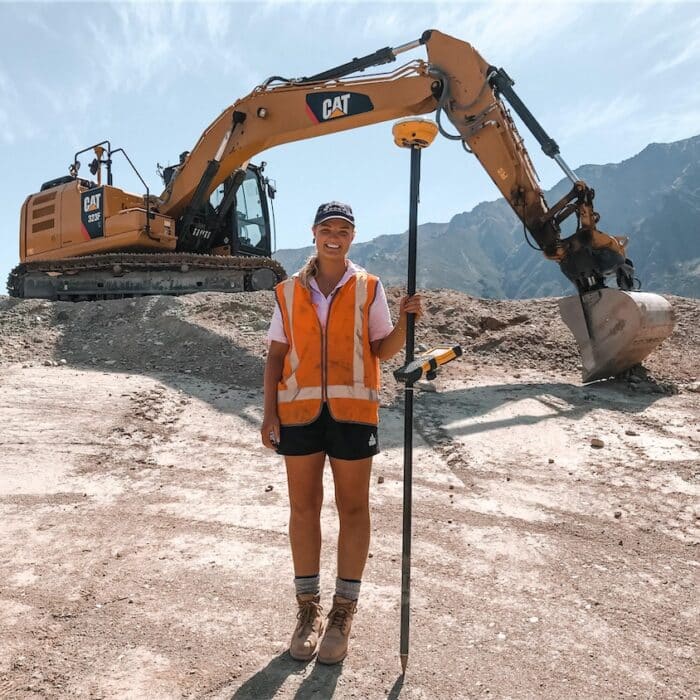21 April 2023
Helping an island community’s people be free of a life of pain
Writer: Sionainn Mentor-King
Photographer: Michelle Marshall
Nearly ten years after her first visit to Aotea Great Barrier Island, massage therapist Abigail Florence has returned to the isolated community to bring the island’s residents relief and relaxation. With the use of traditional therapies, preventative education and self-treatment techniques, she hopes to help people realise that there is an alternative to living with pain.

Physical pain and the wider effects of it are something Abigail, 32, has a sound understanding of. Pain has long been recognised as the body’s way of communicating to us that something isn’t right. When we cut ourselves, break a bone or push our bodies to do something they’re not designed or prepped to do, pain flares up to alert us to the presence of a problem.
“Our bodies work around pain,” Abigail points out. “We’re built to numb pain, to just get used to it.” Abigail explains how a minor ache can go from being a niggle to a debilitating issue because of this numbing facility. “We’re animals. If we were to break our leg and it healed wrong, our body would morph around that issue to keep going the same as any other animal. But putting up with those points of pain long term…we can do it, we’re built to do it, but is it going be beneficial for our lives?”
Massage has always been something that Abigail gravitated to, before she had any formal training. “I’d always been massaging my friends and family, just naturally,” she says. “But I never thought about it as a career.” Abigail’s mother is from Sydney and father is from Hastings, and she “grew up travelling”, including extended stints in both Australia and India. The first time the international citizen visited her father’s homeland of Aotearoa was ten years ago, and it was while staying with dear friends on Aotea Great Barrier that the idea to turn the gift that was already in her hands into a livelihood presented itself. “One of my sisters suggested that I come back to Australia and study massage. It’s easier sometimes for other people to see what you’re good at,” she muses. “I ended up going to Australia to train at the Melbourne Institute of Massage and Myotherapy – starting out with sports massage therapy. That gave me a real passion for anatomy and the intricacies of massage. I went on to study remedial massage, which is more clinical, to improve range of motion and get people out of pain. I did that for two years, then I moved more into deep tissue and relaxation because I was noticing that I would have people come to me needing clinical skills, but then also needing emotional support and nurturing as well. I wanted to be able to provide that.”
For the past seven years, Abigail has worked as a massage therapist in Australia. While she wasn’t living rurally herself during that time, she travelled to rural communities to provide treatments. “I was having so many clients come into the busier areas and tell me like, ‘Oh, we haven’t seen anyone for six months.’ And that’s when I realised how much of a need there was. It really got me thinking that I wanted to create a business that I could take to rural areas for specifically that reason.”
Rural people, Abigail believes, tend to have an attitude of immediacy. “Their environment calls to get things done in the external world now, rather than leaving things for later.” She says this is particularly evident in off-grid communities, where putting things off can have a serious detrimental impact due to weather and resources. This, combined with the physical nature of rural living and the common inaccessibility of treatments and therapy, often leads to people developing chronic or reoccurring injuries.

“I hope this attitude of immediacy can start to spill over into how people think about their bodies, too,” Abigail says. “That more people start taking the initiative to ‘action’ an ache or movement restriction before it has negatively changed their first environment – their body.”
It’s a hope that’s grounded in experience – Abigail has noticed that rural people are much more open to self-treatments, which is something she’s very passionate about. “Generally, in cities people are overloaded, time wise. They want to give you the money and have you do the work and then when they leave. That’s it. They don’t have time to take something home and have to practise it. Whereas in rural communities, I have noticed that, when I say, ‘There’s a couple of things that I could give you to prolong this massage or to help you treat yourself, if you like,’ there’s a higher percentage of people that are interested in implementing those self-treatment techniques at home.”
Gaining a better understanding and learning to listen to our bodies is something that Abigail feels very strongly about. She hopes to eventually provide workshops where people can come along and learn about how to keep their bodies functioning and out of pain. “I want to go over basic movement patterns of everyday rural life, no matter what your role asks of you, such as shovelling, shearing, doing reps with your baby, whatever it is you’re doing, so that you can learn about your body. The goal is to get someone who’s come from ignoring their pain to the point that they don’t even feel their body anymore, to move from that space to seeing how much a small amount of treatment can improve their daily life. That little bit of investment, long term, is so valuable. You’re preventing injury because you realise, ‘Oh, wait, my neck is sore. I’m not going to just put up with that for the next six weeks and not be able to move it at all. I’m going to do those little treatments that I was shown for a couple of days and get my range of movement back.’”

Coming to live on Aotea Great Barrier has been a kind of homecoming for Abigail. People on the Barrier remembered her and welcomed her when she returned. “The people here are amazing,” she says. “You see so many personalities and there’s a wildness to this island that I feel encourages people to be authentic to their true nature. Some smaller communities I’ve been in, there’s a sense of, ‘Oh, be careful, don’t move outside of the group mentality.’ But it’s not like that here because there’s so many different types of people and there’s this real encouragement just to be as you are.”

Though she was raised in cities – including the teaming metropolis of Mumbai – Abigail has always felt drawn to more remote places, having lived in island communities in northern Australia in her younger adult life. She describes the difference in attitude: “There’s a real thoughtfulness that is lacking in a city. I don’t know if it’s because you’re so crammed in there and everyone’s just fighting for their little bubble of space. Here it’s so much more expansive and it’s a slower lifestyle, so you actually have the time to properly connect with someone and remember them.”
Abigail’s fledgling business, Florence Therapies, operates out of three different clinics around the island to make her treatments more readily available to those in remote areas, and her clients are a varied bunch, with equally varying and sometime surprising needs. “I’ll get these little old women in and I’m like, ‘Oh, this will be a relax.’ And it turns out they need deep tissue work and I’m going harder on them than I did on a tradie that came in with his neck out!” she laughs.
The most common complaints Abigail treats are stiff necks, tennis and golfers’ elbow, shoulder tendinitis, lower back pain and nerve entrapment – while also holding space for the body to unravel during times of loss and stress. “What I use to treat specific ailments really depends on how it presents that day,” she explains. “I use myofascial techniques, trigger point therapy, range of motion to see which muscles aren’t performing, different nerve impingement techniques – and then relaxation techniques when it’s something that needs to be moved slowly. Depending on how the muscle presents, some muscles you can go in deep to iron out an issue, but others you need to move it gently, depending on what state it is in and how the body presents that day.”
“This place has always had a big piece of my heart,” Abigail says of her new island home. “There is something really special about the place and the community. It took so many years to get to this point, but I found it. I’m like, ‘Wow, I’m finally doing it.”
After many years of training and hard work, Abigail is using her skills to benefit the Aotea community and actualise her dream of helping people to recognise their pain, heal it and prevent further injury.


This story is part of THREAD, a year-long project by Shepherdess made possible thanks to the Public Interest Journalism Fund through NZ On Air.
If you enjoyed this story, please share with someone else.
Get your hands on a copy of Shepherdess.
Related Stories
Hazelnut Chocolate Brownie
Margo and Rosa's go-to dessert to make when we have friends and family at our table. It’s made with our secret ingredient - black beans.
Courtenay Bevan
Courteney, 28, is a city chef turned charter boat chef/deckie turned Jobs for Nature scientific diver – or, as she calls herself, a “glorified underwater weeder.”



